calsfoundation@cals.org
Logoly State Park
| Location: | Columbia County |
| Size: | 368 acres |
Logoly State Park in southwestern Arkansas was the state’s first environmental education park. At Logoly, interpreters present workshops on ecological and environmental topics, and the park’s natural resources provide a living laboratory for students and nature lovers alike.
The area surrounding Logoly State Park has been the scene of human activity since it was inhabited by Native Americans, whose artifacts have been found in the park. Because mature timber stands cover most of the park, the few artifacts found have been along the trails or water-washed areas. No detailed archaeological surveys have been done to locate any possible village sites.
During the late 1800s, a collection of springs in an area called Magnesia Springs was used by the early settlers of the area. The site attracted travelers seeking to bathe in and drink from Magnesia Springs, which supposedly contained various minerals that cured a variety of ailments. It is believed that Caddo Indians native to the area first introduced settlers to the springs and their purported healing powers.
Near the turn of the century, as word of the springs spread, a small community developed. The Magnesia Springs community had two hotels: the Duke and the Mendenhall. The St. Louis Southwestern Railway (Cotton Belt Line) stopped near Magnesia Springs to unload passengers, who would walk or ride wagons to the springs.
Camp meetings were also held at the springs on property owned by the Methodist Episcopal Church, South. As early as 1888, local Methodists had begun using the site as a gathering place for gospel preaching, visitation, politics, and courtship. A bandstand and a large open-sided pavilion with wooden benches were located within sight of Magnesia Springs. The area was used by the Methodists as late as the 1930s. Eventually the popularity of the springs declined, and the area fell into disuse.
By 1940, the land had come under the ownership of three families: the Longinos, Goodes, and Lyles. These families leased the land to the Desoto Council of the Boy Scouts, who named their summer retreat “Camp Logoly” by combining the first two letters of the three families’ names. The scouts built a mess hall, staff cabins, showers, campsites, trails, and a swimming area.
The boy scouts outgrew Camp Logoly and, in 1967, moved to Camp Desoto near El Dorado (Union County). All structures built for the scouts’ use were removed when Camp Logoly closed. All that remains are a few of the concrete slabs of staff cabins, outdoor toilets, and the water pump.
After the scouts left, one of the landowners, Hugh Longino, contacted the Arkansas State Parks Department about the possibility of turning Camp Logoly into a state park in order to preserve the area’s unique beauty, history, and woodlands.
Because the state parks system was short of funds, the Nature Conservancy purchased the property in 1974 until the Arkansas State Parks Department could obtain funding. The State Parks, Recreation, and Travel Commission approved the purchase of the park that same year, with funding for the purchase provided by the Arkansas legislature in 1975 and 1977.
When the area was purchased from the Nature Conservancy, part of the area was designated as a Natural Area to preserve its environmental features, including unique plant species and the mineral springs. This area, approximately 200 acres of the original 345 acres, protected the mature growth forests of pine, oak, hickory, and beech from any future development. The Arkansas Natural Heritage Commission and the State Parks Department both help manage this area.
When Logoly State Park opened on May 19, 1978, it had the distinction of being Arkansas’s first environmental education state park and only the third of its kind in the nation. Logoly is a popular destination for field trips from area schools.
The park offers a bathhouse, a pavilion, picnic sites, a playground, trails, and a visitors’ center with exhibits and an indoor classroom.
For additional information:
Arkansas State Parks–Logoly. http://www.arkansasstateparks.com/logoly/default.aspx (accessed August 16, 2023).
Staff of the Arkansas Department of Parks and Tourism
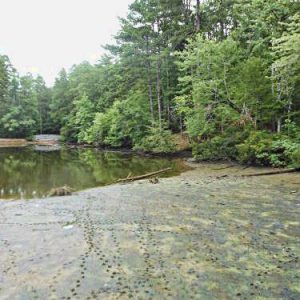 Logoly Natural Area
Logoly Natural Area 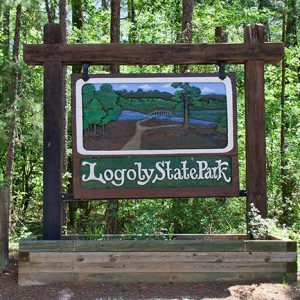 Logoly Entrance
Logoly Entrance 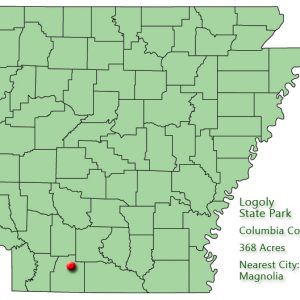 Logoly State Park: Park Location
Logoly State Park: Park Location 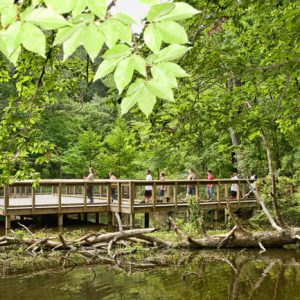 Logoly State Park Pier
Logoly State Park Pier 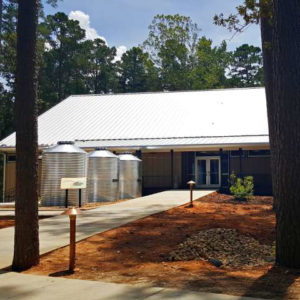 Logoly State Park Visitors Center
Logoly State Park Visitors Center 




Comments
No comments on this entry yet.